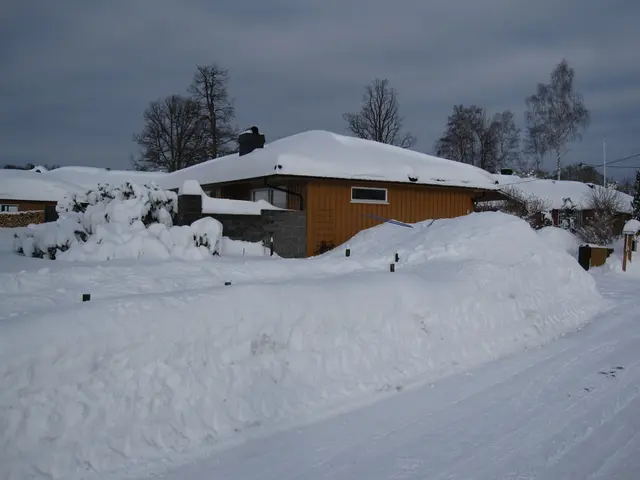Seventy-eight individuals forcibly returned to Afghanistan perish in a brutal bus mishap
In recent times, Afghanistan has witnessed a tragic turn of events, with the Taliban reporting one of the deadliest accidents in years, and a bus accident near the Iranian border claiming the lives of 78 individuals, including 17 children. The incident occurred due to a collision with two vehicles, followed by a subsequent fire.
The bus accident victims were Afghan refugees who had been previously deported from Iran. This unfortunate event is just a small part of a larger picture, as both Iran and Pakistan have been accelerating the mass deportation of Afghans in 2025.
In Iran, the government's decision to deport Afghans is primarily driven by national security concerns, economic pressures, and political factors. Following a 12-day conflict with Israel in mid-2025, Iran accused Afghans of spying for Israel, a claim widely seen as unsubstantiated and a pretext to reduce the large Afghan refugee population and deflect internal dissent. Iran aims to expel up to 4 million Afghans, with approximately 1.1 million having been deported by July 2025. Economic hardships in Iran, including sanctions, inflation, and unemployment, have also fueled public and official calls to expel Afghan refugees, leading to a humanitarian crisis on the Iran-Afghanistan border.
On the other hand, Pakistan's deportations are part of an ongoing “Illegal Foreigners Repatriation Plan” confirmed by Pakistani authorities in July 2025. This plan includes forcibly returning Afghans, even those holding official "Proof of Registration" (PoR) refugee cards. The UNHCR and other agencies decry these forced returns as violations of international refugee protection principles, especially the non-refoulement principle, since Afghanistan remains unsafe, particularly for women, girls, and minorities under Taliban rule. Over 350,000 Afghans were forcibly returned from Pakistan in 2025 alone, exacerbating the humanitarian crisis in Afghanistan.
These mass deportations are happening amid very fragile conditions in Afghanistan, where repression under Taliban rule continues, international support and aid have drastically diminished, and the return of millions from neighboring countries strains already overwhelmed health and social services, intensifying the humanitarian emergency.
| Country | Reasons for Deportations | Circumstances | |---------|----------------------------------------------------|-------------------------------------------------| | Iran | National security claims (spy accusations against Afghans), economic pressures, scapegoating refugees | After Iran-Israel conflict; broad anti-Afghan rhetoric; severe humanitarian crisis at border | | Pakistan| Implementation of “Illegal Foreigners Repatriation Plan”, violation of refugee rights despite PoR cards | Forced returns amid Taliban rule in Afghanistan; international criticism for violating refugee protections | | Both | Contribute to over 2.1 million Afghan returns in 2025 | Surging numbers overwhelm Afghanistan’s fragile health and aid systems |
As the Taliban continues to rule in the western Afghan province of Herat, the situation remains critical for the returning Afghan refugees. The international community must address these pressing issues to alleviate the humanitarian crisis and ensure the safety and well-being of these displaced individuals.
[1] Human Rights Watch. (2025). Iran: Deportations of Afghans Amid Humanitarian Crisis. [online] Available at: https://www.hrw.org/news/2025/10/01/iran-deportations-afghans-amid-humanitarian-crisis
[2] Amnesty International. (2025). Pakistan: Forced Returns of Afghans Amid Taliban Rule. [online] Available at: https://www.amnesty.org/en/latest/news/2025/09/pakistan-forced-returns-of-afghans-amid-taliban-rule/
[3] United Nations High Commissioner for Refugees. (2025). Afghanistan: Returnees Face Challenges Amid Fragile Conditions. [online] Available at: https://www.unhcr.org/news/latest/2025/09/613568864/afghanistan-returnees-face-challenges-amid-fragile-conditions.html
[4] International Organization for Migration. (2025). Afghanistan: Returnees Strain Health and Aid Systems. [online] Available at: https://www.iom.int/news/afghanistan-returnees-strain-health-and-aid-systems
Read also:
- United States tariffs pose a threat to India, necessitating the recruitment of adept negotiators or strategists, similar to those who had influenced Trump's decisions.
- Weekly happenings in the German Federal Parliament (Bundestag)
- Southwest region's most popular posts, accompanied by an inquiry:
- Discussion between Putin and Trump in Alaska could potentially overshadow Ukraine's concerns








